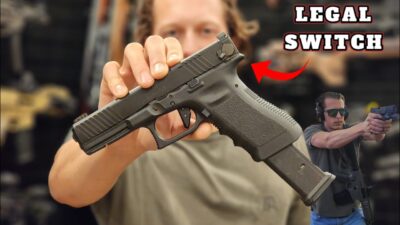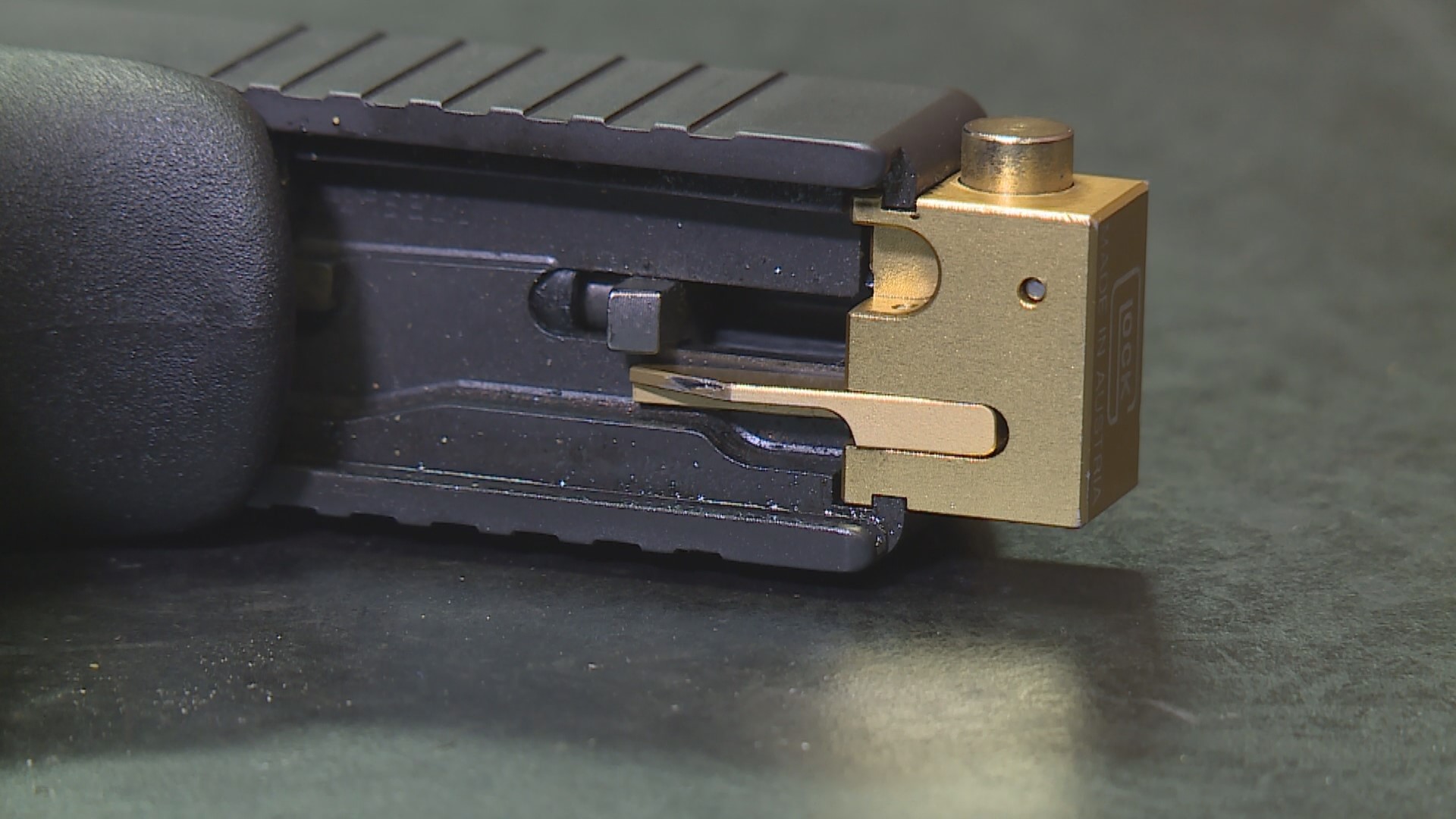The Glock pistol is one of the most widely recognized and popular handguns in the world, especially favored by law enforcement, military personnel, an
The Glock pistol is one of the most widely recognized and popular handguns in the world, especially favored by law enforcement, military personnel, and civilians alike. Known for its reliability, simplicity, and durability, the Glock has become a staple in the firearms community. However, alongside its legitimate use, there has emerged a controversial device called the “Glock switch,” which has sparked significant debate, concern, and legal scrutiny.
In this article, we’ll explore what a Glock switch is, how it works, why it’s controversial, the legal status surrounding it, and the broader implications for firearm safety and regulation.
What Is a Glock Switch?
A Glock switch, also known as an auto sear or a machine gun conversion device, is a small, often palm-sized component designed to convert a semi-automatic Glock pistol into a fully automatic weapon. When attached to a Glock handgun, this device can allow the firearm to fire continuously as long as the trigger is held down, dramatically increasing its rate of fire.
Glock pistols, by default, are semi-automatic, meaning they fire one round per trigger pull. The introduction of a Glock switch essentially changes the firing mechanism, enabling a rapid burst or full automatic fire, similar to what you would see on a machine gun.
How Does a Glock Switch Work?
Technically, the Glock switch acts as a mechanical trigger activator. It modifies or bypasses parts of the Glock’s internal firing system, such as the trigger bar or striker mechanism, allowing the gun to fire multiple rounds with a single trigger pull.
Due to the Glock’s modular design, the switch can often be easily attached or removed without permanent alterations to the firearm, which adds to its appeal for some users but raises serious safety and legal concerns.
Why Is the Glock Switch Controversial?
The Glock switch is controversial for several key reasons:
- Legal Status
In many countries, including the United States, fully automatic firearms and their conversion devices are heavily regulated or outright banned under the National Firearms Act (NFA) and other laws. The Glock switch, by converting a semi-automatic pistol into a fully automatic weapon, typically falls under the category of an unregistered machine gun, making its possession illegal without the proper federal licenses. - Safety Concerns
Fully automatic weapons can discharge rounds at a very high rate—often hundreds or thousands per minute. This rapid fire capability drastically increases the risk of unintended injuries, accidents, and misuse, especially if used irresponsibly or by individuals lacking training. - Criminal Use
Law enforcement agencies have reported that Glock switches have been used by criminals to enhance the firepower of otherwise semi-automatic handguns. The ease of conversion can make these devices attractive to illicit actors seeking to increase lethality in violent crimes. - Law Enforcement Challenges
Because a Glock switch is small and easily concealable, it presents enforcement challenges. Detecting and regulating these devices requires resources and awareness among both officers and the public.
The Legal Landscape of Glock Switches
United States
In the U.S., the Bureau of Alcohol, Tobacco, Firearms and Explosives (ATF) classifies Glock switches as machine guns under the NFA. This means they are regulated the same as fully automatic weapons.
- Illegal Possession: Owning a Glock switch without proper registration and licensing is a federal felony, punishable by significant fines and prison time.
- Manufacture and Sale: Manufacturing, selling, or distributing these devices without federal approval is also illegal.
- Online Marketplaces: Despite the illegality, Glock switches have occasionally been sold on black markets or through illicit online sources, prompting crackdowns by law enforcement.
Other Countries
Many other nations have similarly strict laws regulating automatic firearms and conversion devices. For instance, countries with stringent gun control laws typically ban Glock switches outright, considering them illegal firearms accessories.

How Law Enforcement and Regulators Respond
Given the dangers posed by Glock switches, law enforcement agencies have ramped up efforts to educate the public, increase detection, and enforce laws related to these devices.
- Public Awareness Campaigns: Agencies aim to inform firearm owners about the legal risks and dangers of owning or using a Glock switch.
- Increased Patrols and Inspections: Police may conduct raids or inspections in areas suspected of harboring illegal firearm modifications.
- Seizure and Prosecution: Authorities actively seize Glock switches and prosecute individuals found in illegal possession.
The Ethical and Social Debate
The emergence of Glock switches sparks wider debates over firearm rights, gun control, and public safety.
- Gun Rights Advocates argue that lawful gun owners should be able to modify their firearms as they see fit, provided they do not pose a threat to others. However, many also recognize the dangers posed by unregulated automatic fire.
- Gun Control Advocates point to the Glock switch as an example of why tighter regulations and enforcement are necessary to prevent violent crime and enhance public safety.
- Public Safety Experts focus on educating both policymakers and the public about the risks associated with fully automatic firearms and conversion devices.
Alternatives and Legal Options
For firearm enthusiasts interested in automatic weapons, there are legal alternatives:
- Registered Machine Guns: Under the NFA, civilians can legally own fully automatic firearms, including converted Glock pistols, but only if they are properly registered and taxed.
- Simulated Automatic Fire: Some manufacturers produce semi-automatic pistols with burst-fire simulators that mimic automatic fire but do not actually increase the rate of fire.
- Training and Competitions: Many gun owners focus on improving their skills with legal semi-automatic firearms without resorting to illegal modifications.
Risks of Using a Glock Switch
Besides the legal risks, there are significant practical risks:
- Malfunction and Injury: Modifying a firearm with an untested or poorly made switch can lead to mechanical failure or injury.
- Unintended Discharge: Fully automatic fire is harder to control, increasing the risk of accidental shootings.
- Escalation of Violence: Enhanced firepower in the hands of criminals can lead to more deadly encounters.
Conclusion
The Glock switch represents a serious intersection of technology, law, and public safety. While the device itself is a small piece of hardware, its ability to transform a semi-automatic pistol into a fully automatic weapon raises significant concerns for regulators, law enforcement, and the community.
Understanding the legal status, risks, and implications of Glock switches is essential for firearm owners and anyone interested in gun policy. Responsible gun ownership requires adherence to laws and consideration of safety for oneself and others.
Frequently Asked Questions (FAQs)
Q1: What exactly is a Glock switch?
A Glock switch is a small device that can convert a semi-automatic Glock handgun into a fully automatic weapon by altering the firing mechanism.
Q2: Is it legal to own a Glock switch?
In most jurisdictions, including the U.S., it is illegal to own, sell, or manufacture a Glock switch without federal registration and licensing because it is classified as a machine gun conversion device.
Q3: Why are Glock switches dangerous?
They enable fully automatic fire, which increases the risk of accidental discharge, loss of control, and misuse in crimes due to the rapid firing capability.
Q4: Can you legally convert a Glock pistol to fully automatic?
Only if the conversion device is registered and the owner has the proper licenses, typically under strict National Firearms Act (NFA) regulations in the U.S.
Q5: How do law enforcement agencies handle Glock switches?
They conduct enforcement actions to seize illegal devices, prosecute offenders, and educate the public on the dangers and legal status of these conversion tools.
Q6: Are there legal alternatives to owning a fully automatic Glock?
Yes, fully automatic firearms can be legally owned if registered under the NFA, and some manufacturers make semi-automatic firearms that simulate automatic fire without conversion devices.
Q7: How common are Glock switches in criminal use?
They have been increasingly reported in certain criminal cases, raising concern due to their small size, ease of use, and the significant increase in firepower they provide.
Q8: Can a Glock switch damage the firearm?
If poorly made or incorrectly installed, it can cause malfunctions or damage to the firearm and potentially injure the user.
More Info: spotlightlive




COMMENTS